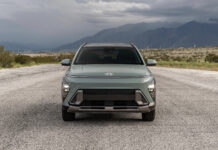Volvo is reportedly scrambling to fix crippling software issues with its latest electric crossover.
After months-long delays, the Volvo EX90 went into production here in the U.S., but it still hasn’t been entirely smooth. In fact, the Swedish automaker noted its $80,000-plus crossover would arrive missing some features like cross traffic alert, front automatic braking, some lidar functionality and even Apple CarPlay, after already pushing back the launch due to software glitches. Now, according to a new report from Autocar, things are even worse for the tiny EX30 over in Europe.
As it happens, the Volvo EX30 joins the likes of the Chevrolet Blazer EV, Volkswagen ID.3 and indeed its own EX90 sibling in having its launch hampered by issues such as blacked-out infotainment screens, incorrect information displayed on the screen when it actually functions including driving range, driver profiles reverting back to factory settings and driver aids not functioning correctly. The Autocar report mentions the emergency braking system randomly activating, which obviously creates a safety issue if the EX30 is driving in an area with heavy traffic.
The EX30’s software problems are so pervasive that some customers are actually returning their cars altogether. “In a very small number of cases in the UK,” the company said in a statement, “customers have chosen to exercise their consumer rights to return their cars. Volvo Cars strives and continues to support its customers throughout the ownership journey, and overall we continue to be encouraged by the positive feedback we are receiving from owners.” Even with that optimistic take at the end, the company also acknowledged, “We recognize this is not what they expect from their Volvo car, and we are working to remedy this as swiftly as possible with the minimum of inconvenience to our customers.”
Volvo UK removed access to the EX30 configurator, though it insists that is because the 2025 model is going on sale next week, on July 8. “The EX30 continues to be sold in the UK,and with more than 4,500 already delivered to customers this year, it is proving popular, backed by a strong order book,” it also told Autocar.
Through the end of May, Volvo sold more than 35,000 EX30s, making it the third most popular EV after the Tesla Model Y and Model 3.
The EX30 is already delayed until next year for the U.S. market.
While Volvo faces major issues getting its software up to scratch over in Europe, it’s also facing headwinds launching the EX30 in the United States. Just last week, the automaker said it would delay the EX30 until 2025, though it blamed the “global automotive landscape”, and not software issues. Namely, the affordably priced crossover was going to come from a plant in Zhangjiakou, China — a move that would subject the car to a 100% tariff on Chinese-made vehicles recently put in place by the Biden administration.
As a result, Volvo will likely gear up its Ghent, Belgium facility to build units for Europe and the U.S., though that switch will take time.
Apart from sorting out a manufacturing solution to avoid major tariffs, Volvo is now obviously working to address the EX30’s software problems. As with the EX90, the automaker already delayed its launch to try and sort things out, though this report clearly indicates its software team has more work to do.
For now, the fix does not include a stop-sale, though it does underline the increasingly common condition of new vehicles (and new EVs, particularly) launching with debilitating software faults. The approach to dealing with such situations is essentially to patch the problems out through over-the-air updates, so owners do not have to visit dealers. That’s what Volvo did just last month, actually, when it recalled every EX30 built to date to address a problem with the car’s speedometer going into “test mode” at startup and not displaying accurate information.
Against a backdrop of manufacturers promising dozens of new models in the coming years, accelerated development time frames may make this “fix it in post” mentality an industry norm, to the frustration of new car buyers shelling out more money than ever before on their next purchase.
As Volvo already announced a delay for the U.S.-bound EX30 into 2025, we’ll have to wait and see whether these recent software issues cause any further delays. At the moment, that does not appear to be the case, but it may depend on how quickly the company’s software engineers can address all the present issues.



























